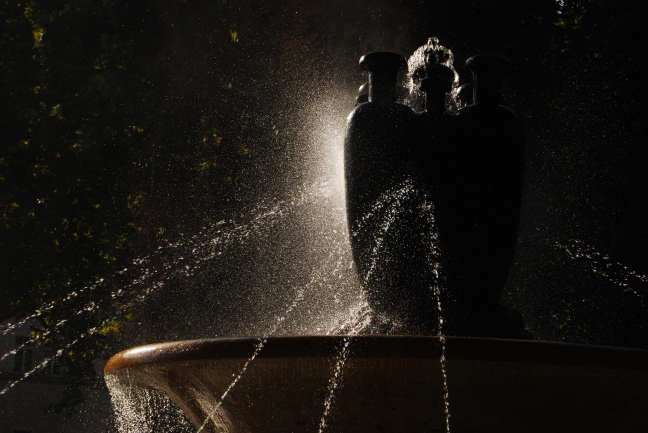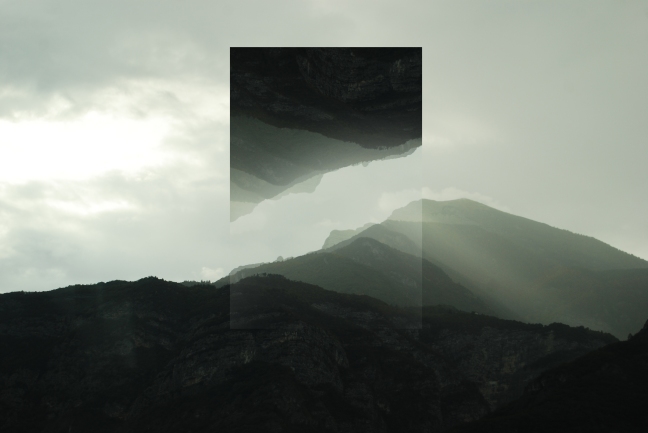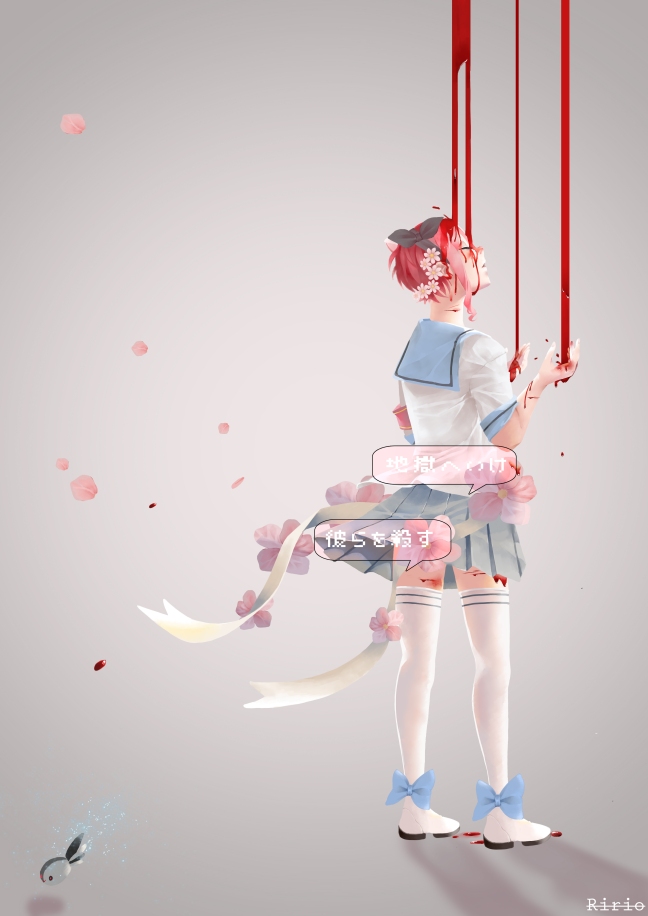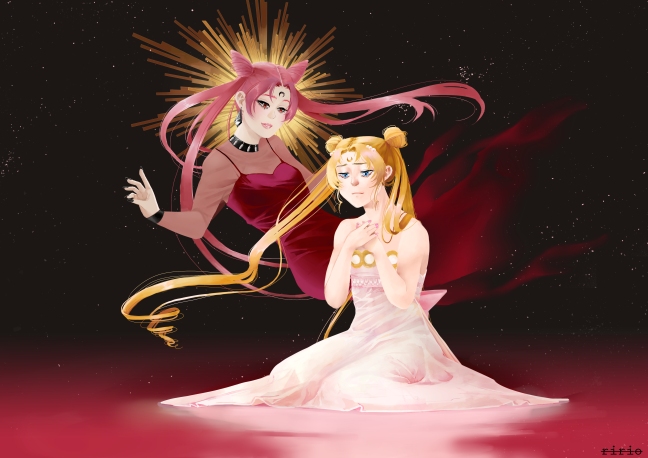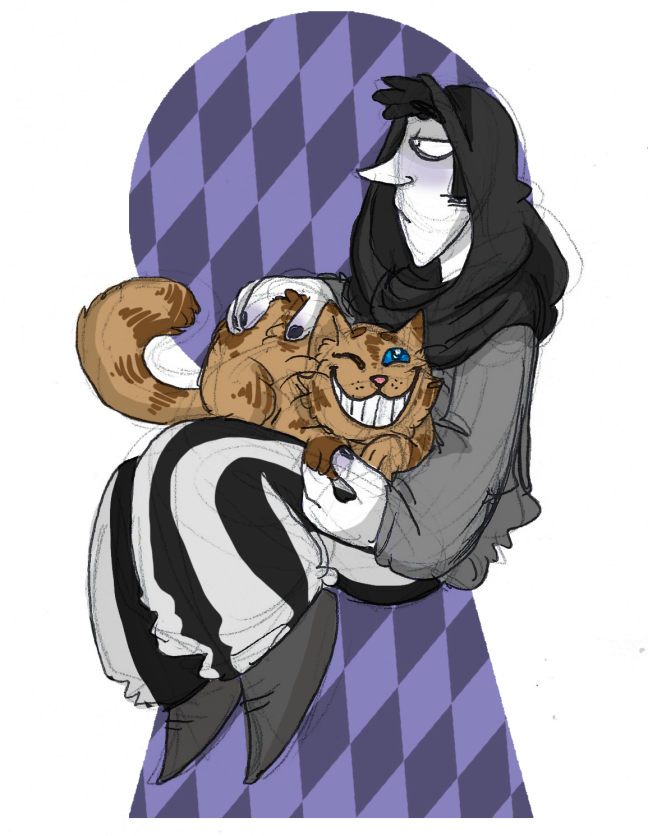Today we’re joined by Allyzah Allene, who also goes by Ani or Ani Fangor. Allyzah is a phenomenal visual artist who works with in digital and traditional mediums. They haven’t met a material they didn’t like and work with just about everything. Their work is brimming with detail and a masterful use of lines and colors. They’re incredibly dedicated, as you’ll soon read. My thanks to them for taking the time to participate in this interview.

WORK
Please, tell us about your art.
I am an artist that likes to dabble in just about everything I can afford. I have worked with traditional mediums like pencils (graphites, colored pencils), charcoals, markers, paints (acrylic, watercolor, oil) and digital mediums (limited photoediting, mostly digital art). My goal is to be able to learn as many mediums as I can because I want to teach art. I also occasionally write, and recently began posting my comic on Tapas.
While many other artists have a “deeper meaning” behind their artworks, or a consistent theme, I find art to be most enjoyable when it is “whatever I feel like.” I don’t like stressing over incorporating hidden meanings and “how it may be interpreted,” but rather getting the idea out of my head. My art blog and my art tag ends up being full of random half done pieces and concepts because it’s not always about finishing, but expressing my ideas. (Perhaps not the best rule to live by, but as a student, it’s enough for me.)
What inspires you?
Most of the time, the deadline. Otherwise it’s usually whatever I find aesthetically appealing enough to draw!
For my writing and my comic, though, that was inspired by the lack of diversity in the media I consumed. I got tired of the same old “boy meets girl” plot/subplot found in most things I read, and especially, the lack of characters who even vaguely looked like me. Growing up, the books I read often degraded characters that shared my race or ethnicity, and I struggled with my identity until I was 16 (a mere four years ago). I hated who I was because I wasn’t white, and I thought that I would only be successful if I were like the white characters in my books—even then, that could be a stretch, as there were very few books with girls as the lead. I didn’t find out that I wasn’t cishet until I was about 15, and by then I barely read outside of the class readings, so I wasn’t as bothered by the lack of LGBT+ positive books just yet. In my junior year, I had my “if no one else is going to do it, I will” moment and decided I would make a comic featuring a diverse cast in both ethnicity, gender identity, and sexual/romantic orientation. It took a while, but I finally decided I had put it off long enough and started publishing pages early July 2017 as my 20th birthday gift to myself.
What got you interested in your field? Have you always wanted to be an artist?
When I was in the second grade, my school’s art teacher brought a guest artist to speak to everyone. I don’t remember the name of the artist, but I remember being so intrigued—it was one thing to learn about Van Gogh and Picasso in class, and a completely different thing to see someone live at work that wasn’t my teacher. The way he worked was by covering a canvas with black charcoal, and slowly erasing it away to create an image. My art teacher later caught me trying to do the same thing while waiting for my dad to pick me up, and asked me if I wanted to be an artist when I grew up. It wasn’t something I had thought of before, but I remember being so happy that she thought I could, and I said yes. Since then, I have been on a quest to learn as much as I can about art so that I can help as many people as possible when I become a teacher.
As for writing, we have a rocky relationship. During elementary school, I had a pattern: I would love writing one year, and hate it the next. I didn’t really take it seriously for a while, even when I started writing and posting fanfiction. I found out about NaNoWriMo in middle school, and became serious about writing original work, although the passion and motivation is not nearly as consistent as with art.

Do you have any kind of special or unique signature, symbol, or feature you include in your work that you’d be willing to reveal?
I don’t know if I’ve been consistent enough with anything to have one of those! The closest thing is the stamp I use to sign my artwork (when I have it). I visited China two years ago as part of an exchange program, and the Chinese students gave me an approximate phonetic translation of my name so that I could have a “Chinese name.” I bought a stamp with that name on it to remember them and the trip, and I use it as half of my artist signature.
What advice would you give young aspiring artists?
Besides the ever present “keep practicing,” I’d say “if you can’t figure out what’s wrong with it, put it on pause and work on something different; it’ll come to you sooner than if you keep focusing on it.” If it’s art, that one part will still be waiting for you to come back, and if it’s writing, you can always just type in something like “akdguhos” or “[COME BACK TO THIS]” and continue. (Just make sure that you go back to it before you publish it or turn it in!) You don’t have to finish everything in one go. Take a break, let your creative juices recharge.
Something specifically for visual art: we tend to hyperfixate on the small area that we’re currently working on. Every now and then, remember to step back (or, if digitally, zoom out) and look at the piece as a whole. Something might look okay while zoomed in… and then you look at the whole picture and realize that it’s completely misaligned or maybe the color palette doesn’t match the rest. I’ve worked on several semi-realistic pieces and realized that the “perfect nose” was too far right, or that it looked like the neck didn’t come from the same body as the head, because I didn’t look at the whole picture as much as I should have.

ASEXUALITY
Where on the spectrum do you identify?
I am asexual sex-repulsed, and demi-panromantic. (As well as agender/non-binary.)
Have you encountered any kind of ace prejudice or ignorance in your field? If so, how do you handle it?
I’ve been lucky enough not to encounter any prejudice in my major related classes yet, but that’s partially because I don’t know anyone well enough to actually care what they say, partly because I have headphones in during class almost all the time. I have had people try to get “creative” with their flirting though, automatically assuming that because I’m an artist, I draw nude people, and that I’d want to draw them … How I respond to them depends on how rude they’re being.
What’s the most common misconception about asexuality that you’ve encountered?
Ohh boy, there’s so many that I spent three years researching asexuality in order to academically debunk misconceptions and presented speeches about asexuality to just about any academic platform I could reach. (I’m no longer doing competitive speech as I switch to the coaching side of things, but I’m still ready to spread asexual awareness.)
The one that I hate the most is when people think asexuals are being childish if they state that they have no sexual attraction, especially if they say that they’re a sex-repulsed ace. I’ve had people say that I’ll eventually “grow up and want sex,” and when I literally had an anxiety attack due to a class assigned movie (marked UnRated and with no CW/TW in the film description, nor from the professor) that featured multiple explicit sex scenes and nudity, I was told to grow up and realize that “sex is an art form. You’re an artist, why can’t you appreciate that?” It’s frustrating that sex is seen as a major turning point in your life, the time you’ve “finally reached adulthood,” when there’s plenty of us who can live without it.

What advice would you give to any asexual individuals out there who might be struggling with their orientation?
Most importantly: you are not broken. Your orientation doesn’t make you any less valid than anyone else! Remember, for every person that takes you down, there’ll be many ready to help lift you back up again.
Also, it doesn’t matter if you fit some of the stereotypes or misconceptions of asexuality or not, you can still identify as ace. Things like “you can’t know if you’re ace if you’re a virgin,” “it’s just a hormonal imbalance,” “it’s because of PTSD/similar,” it doesn’t matter if these are true or not for you. If you feel like asexuality is the best label for your orientation, then you’re ace.
Finally, where can people find out more about your work?
I post my work on Tumblr with the tag “#ani amount of art” on both aniamountofart.tumblr.com and aniamountofsketches.tumblr.com; on Instagram/Twitter tagged #aniamountofart on artisticAllyzah; and my comic can be found at tapas.io/series/OMNI!

Thank you, Allyzah, for participating in this interview and this project. It’s very much appreciated.

